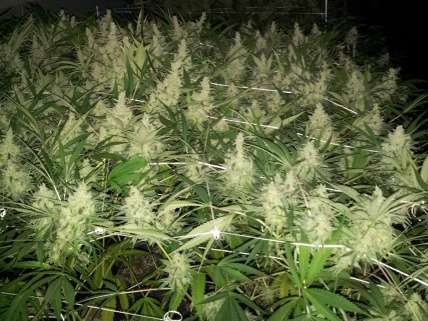Despite Medical Marijuana, Pot Smell Justifies Searches in Arizona
The state's top court rules that the odor of plants or burnt bud provides probable cause "in most circumstances."

In a pair of cases decided yesterday, the Arizona Supreme Court ruled that the smell of marijuana still generally supplies probable cause for a search in that state, nothwithstanding the legality of medical use. Since the Arizona Medical Marijuana Act (AMMA) allows possession and cultivation only for people who meet specified conditions, the court reasoned, "the odor of marijuana in most circumstances will warrant a reasonable person believing there is a fair probability that contraband or evidence of a crime is present."
One of the cases involved Ronald Sisco, whose indoor growing operation at a Tucson storage facility was discovered in 2013 after police obtained a warrant based on "a strong odor of fresh marijuana." The other case involved Ian Cheatham, whose car was pulled over in 2013 based on suspicion of illegal window tinting and searched based on a "pretty strong" odor of burnt marijuana emanating from the vehicle, in which police found a small amount of pot under the driver's seat. Both defendants argued that in light of AMMA—which allows a patient with a state-recognized "debilitating medical condition" and a doctor's recommendation to possess up to two-and-a-half ounces of marijuana and to grow up to 12 plants at home if he lives more than 25 miles from the nearest dispensary—what used to be incriminating smells no longer suffice to justify a search. The court disagreed (citations omitted):
AMMA did not decriminalize the possession or use of marijuana generally….Instead, AMMA makes marijuana legal in only limited circumstances. Possession of any amount of marijuana by persons other than a registered qualifying patient, designated caregiver, or medical marijuana dispensary agent is still unlawful, and even those subject to AMMA must strictly comply with its provisions to trigger its protections and immunities. Thus, when an officer detects marijuana by sight or smell, the "degree of suspicion that attaches" remains high, notwithstanding AMMA. A reasonable officer is therefore justified in concluding that such sight or smell is indicative of criminal activity, and thus probable cause exists.
The court added that other considerations, such as the presentation of a patient ID card issued by the Arizona Department of Health Services, might negate what would otherwise be odor-based probable cause. "Because probable cause is determined by the totality of the circumstances, and marijuana possession or use is lawful when pursuant to AMMA," it said, "a reasonable officer cannot ignore indicia of AMMA-compliant marijuana possession or use that could dispel probable cause." Neither Sisco nor Cheatham was a state-registered patient.
If Arizona did "decriminalize the possession or use of marijuana generally," the court noted, "our analysis and conclusion in this context might well be different." Courts in Alaska and Massachusetts have ruled that decriminalization means the smell of pot by itself is no longer provides probable cause for a search. An initiative that is expected to be on Arizona's ballot in November would legalize the production, distribution and possession of marijuana for recreational use.
A lawsuit filed yesterday by Maricopa County Attorney Bill Montgomery and other prohibitionists seeks to block that initiative. Among other things, the plaintiffs argue that the initiative summary presented to petition signers is legally indadequate and that the measure violates the state constitution's Gift Clause by giving licensing preference to current operators of medical marijuana dispensaries.


Show Comments (5)